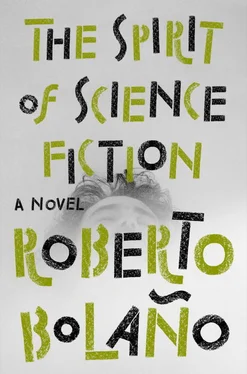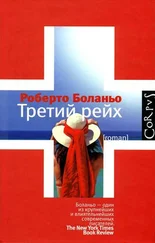At last we went in, though I almost had to drag José Arco. Estrellita scarcely noticed our presence at the table. Teresa and Angélica Torrente, however, didn’t seem pleased to have to suddenly change the subject. José Arco, embarrassed (my friend, I realized then, was excruciatingly shy around girls he liked), introduced me in a way that was clearly an apology for the intrusion. Hello, I said. José Arco coughed and asked what time it was. Before he could escape, I pulled up two chairs, and we sat down.
“So you’re Teresa.” The look on José Arco’s face was more agonized than withering. “The other day, we left the motorcycle outside your place, did you see it?”
“Yes.” Teresa—another discovery—could be ice-cold, though she was only nineteen or twenty.
Angélica Torrente seemed friendlier and nicer.
“Where the hell did you come from?” she asked.
“Me?… From Chile…”
The two of them laughed. Estrellita’s beatific smile deepened slightly. I smiled. Ha-ha. Yes, I’m from Chile. Angélica Torrente was seventeen, and she had won the Eloísa Ramírez Prize for young poets. (Eloísa Ramírez had died fifteen years ago, before she turned eighteen, leaving behind a giant stack of papers and a pair of inconsolable parents who, in her memory, awarded a not-insignificant annual cash prize for the best collection of poetry by a writer under twenty or twenty-one or something like that.) Angélica Torrente’s charms were electric, mainly, and a touch acidic. She talked like a person on the crest of a wave; she could see everything from up there, though she didn’t pay much attention to the sights because of the speed and the falling. She was definitely very beautiful, sometimes even painfully so. She had a laugh—unusual for her age—that was the thing you remembered most about her when she dumped you in the end; it was her signature, her trademark, her weapon. She laughed easily, an open, happy laugh, and the combination of the sound and the way she moved hinted at dark dreams, paranoia, the urge to live life to the hilt whether or not you ended up battered and bruised. Teresa was different: not only did she seem more serious, sometimes she actually was. She was a poetess, too, though unlike Angélica and the others I would soon meet, Teresa worked. She was a typist, and she was studying medicine, in her second semester. She didn’t live with her parents. She was beginning to make a name for herself in some journals—not many of them, but good ones—as someone not to be overlooked when anthologies of young Mexican poets were assembled. Her relationship with José Arco, despite appearances, was completely atypical. I never knew, and never asked, whether they had slept together. Maybe they had, maybe they hadn’t. I don’t think it matters. It’s common knowledge that Teresa came to hate José Arco, which I presume means that at some point she loved him. There’s one thing that tells you all you need to know about Teresa: she would never lend you a book, and if you made the mistake of loaning her one—as José Arco did a thousand times at least—you could bet anything that you would never see it again, or if you did, it would be in her bookcase, blond wood with mahogany streaks and knots, very pretty, very elegant. Between the two girls, Estrellita was like a grain of sand in a saucer of coffee.
“We’ve been looking for you, Estrellita,” said José Arco.
Estrellita sighed. Then she said “hmm,” gazing past my friend’s forehead, and she sighed again, putting everything into her smile.
“We’ve been looking for you because of the Weekly you gave me the other day.”
“Hmm?”
“Do you remember? The Conasupo Cultural Weekly, about the poetry workshops…”
“Ah? Hmm…” Estrellita studied a point in the distance and huddled into her coat.
“Do you remember it? A long list of poetry workshops, Mexico City poetry workshops.”
“What are you talking about?” asked Angélica.
“A really weird magazine, maybe a conspiracy,” I said.
“Oh, yes…” said Estrellita. “Did you like it?”
“Very much.”
“Oh, I’m glad…”
“I’d like to know where you got it…. Who gave it to you?”
Estrellita smiled. There wasn’t a single tooth in her mouth.
“Hmm, it’s a strange story, a lovely one…”
“Tell us,” said José Arco and Teresa.
But the old woman sat there unmoving, her pale green eyes fixed on the tabletop. We waited. The sounds of La Habana, dwindling at this time of night, wrapped around us like Estrellita’s threadbare coat. It was nice. Now Angélica Torrente showed herself to be the most practical of us all.
“Do you want another coffee?”
“Yes.”
Not many knew exactly who Estrellita was. She turned up in the most unexpected places, like a battered reproduction of the Angel of Independence or Liberty Leading the People. No one knew where she lived—though theories were ventured—or even if Estrellita was really her name. When asked, she would sometimes say that it was Carmen, or Adela, or Evita, but she also claimed that Estrella was her real name and not, as was commonly believed, the pet name given to her by some old man from Spain who had killed himself. At La Habana, it was assumed that she was a poet, though as far as I know, no one, or hardly anyone, had read anything she wrote. According to her, rivers and rivers of ink—seas of ink—had flowed since she published her last sonnet. She had a son. The old reporters who hung around La Habana didn’t know much about art, but they swore that he had been a good painter. In fact, Estrellita’s only visible source of income was a set of prints made from her son’s drawings, which she sold from table to table. It was said that heroin had ended his career but that he was still alive, and here came the saddest part: he was living with his mother. The drawings were wild, reminiscent of Leonora Carrington: spiderwebs, moons, bearded women, dwarfs—bad, essentially. There must have been about twenty of them, maybe fewer, copied a thousand times over, because Estrellita really did sell them and she never ran out. Who had ordered so many prints? The son himself? Judging from the paper, they had been printed at least fifteen years ago. Estrellita considered them a blessing, and maybe they were: she supported herself and her son—who was in his forties now—on the proceeds, tucking sweet rolls for him into the deep pockets of her coat and nourishing herself on milky coffee in tall glasses with a long spoon so that she could reach the bottom without wetting her fingers, font of energy.
“Don’t burn yourself,” said Angélica.
Estrellita sipped, tasting, then put in enough sugar for three glasses.
“Hmm, delicious,” she said.
“Do you like it very sweet?” asked Angélica.
“Yes.”
“Estrellita, are you going to tell us where you got the Weekly ?”
“Yes, yes…”
“Where?”
“At a supermarket…”
José Arco opened his eyes and smiled.
“Of course,” he said. “I’m an idiot.”
“I went in to buy a princess dress…”
“…”
“And a yogurt…”
“…”
“And they gave me this paper, for free…”
“Thank you, Estrellita,” said my friend.
“Are you doing anything tonight?” asked Angélica Torrente half an hour later, informed of all the dumb things—according to her—that we’d been doing.
“No,” I said.
“There’s a kind of party at my place. Do you want to come?”
“I’d love to,” I said.
Dear Fritz Leiber:
I think you must know this story. Like love at first sight, without the love, comes the True Encounter; every organ in the body transmitting and receiving; organic radar units shuffling along the last streets of a Latin American city, drinking and taking peso buses, winking at the void. At the other end of the bar, the anthropoid suddenly discovers that the stranger, too, is interested in the figures sketched on the wall. After that, everything moves even more slowly, if possible; a montage of aquatic scenes of two characters who meet in unexpected places; washrooms in fleabag movie theaters, cantinas frozen in 1940, underground clubs, the Chapultepec roller coaster, dark and deserted parks. And then there is the only repeated scene: the first and last meeting of the terrestrial explorer and the alien takes place in the inner courtyard of a pulquería. Upon exiting through the wrong door, the earth dweller comes across the alien vomiting in a corner. Calmly, he raises his video camera and records the scene. What the alien registers is not the barely perceptible hum of the camera but the presence of something that he has been obscurely pursuing for centuries. When he turns, the moon disappears behind the rooftops. The owner of the establishment says she heard shouts, splashing, curses, singing. Real nice guys, a couple of sympathetic empaths, was how she put it. That night, she found bloodstains on the dirt floor of the courtyard. This is the source of the legend that once a year, in mid-February, the tourist and the local still do battle in the sky. The truth, I think, is that they both died that night. Is there any American university that might put up money for a team to search for clues to this Mystery? Some private foundation, maybe? It’s a true story, and I’m afraid that it’s prophetic. It’s in our mutual interest, etc., etc., for our mutual survival, etc., etc.
Читать дальше












